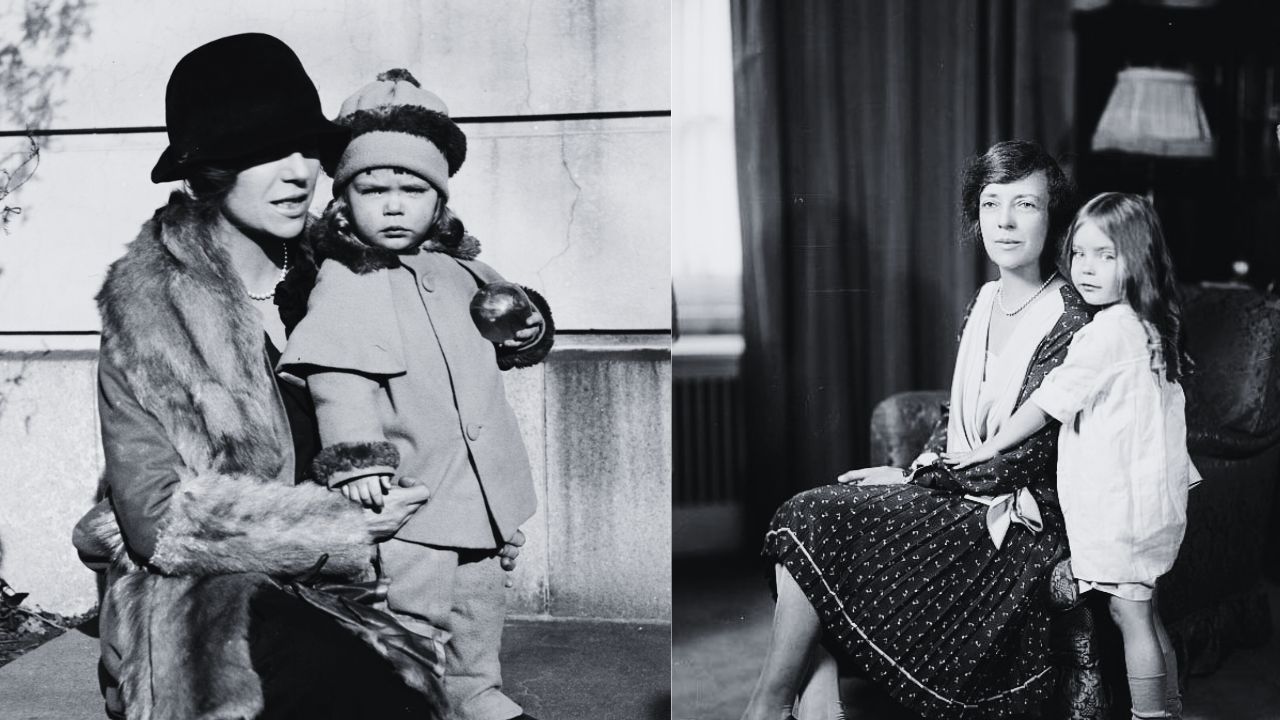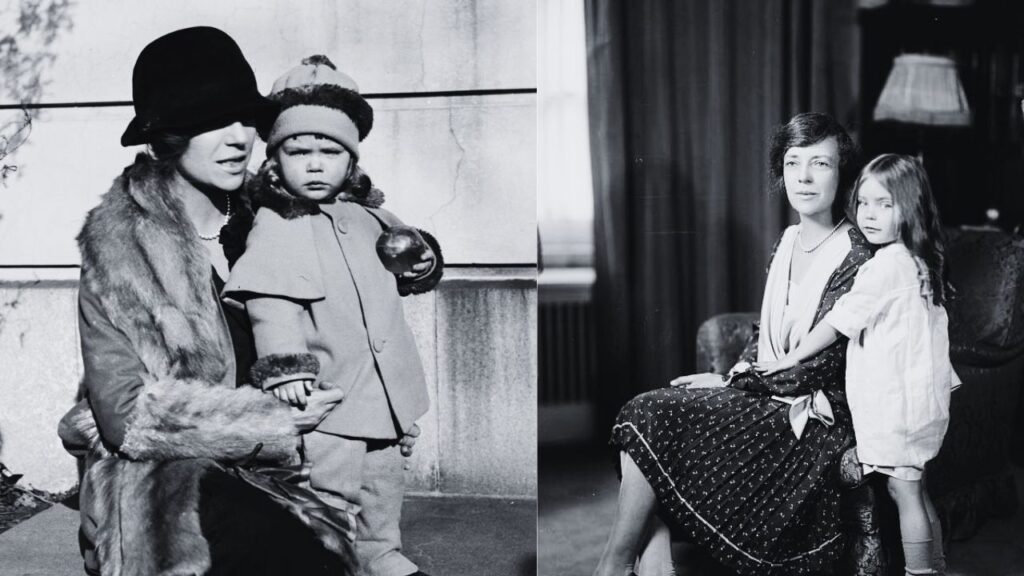Paulina Longworth Sturm’s life was a blend of glamour, struggle, and tragedy, which unfolded amidst the backdrop of one of America’s most influential families. Born into the famous Roosevelt family, her life was marked by a complex relationship with her parents, a brief education, and a vibrant social life.
Early Life and Family Background
Born on February 14, 1925, in Chicago, Illinois, Paulina Longworth Sturm was the only child of Alice Roosevelt Longworth and Nicholas Longworth III. Her birth marked the anniversary of the deaths of her grandmother and great-grandmother, adding a layer of historical depth to her life from the start. As the granddaughter of President Theodore Roosevelt, Paulina was born into a family of significance, and this came with its own set of challenges and expectations.
Her parents, Alice Roosevelt Longworth and Nicholas Longworth III, were well-known names in the political realm. Nicholas was a prominent figure as the Speaker of the House of Representatives. Alice, on the other hand, was known for her strong personality and her affair with Senator William Borah from Idaho. The whispers about Alice’s affair were so widespread that many believed that Borah was Paulina’s biological father, adding another layer of complexity to her already complicated family background.
Relationship with Parents
Paulina’s relationship with her parents was far from the idealized picture one might imagine. Her mother, Alice, was a domineering figure, and her neglectful behavior had a significant impact on Paulina’s early life. This lack of maternal warmth contributed to Paulina’s stutter and low self-confidence, issues that she struggled with throughout her life.

Despite her strained relationship with Alice, Paulina found solace in her relationship with her father figure, Nicholas Longworth. He provided the emotional support that Alice did not, and his death when Paulina was just six years old dealt a significant blow to her young heart.
Education and Social Life
Paulina’s education took her to Vassar College, a prestigious institution known for its rigorous academic environment. However, the pressures of college life proved overwhelming for her, and she returned home without completing her studies. This decision was not an easy one, but it was one that Paulina felt was necessary for her well-being.
Despite her struggles with education, Paulina was no shrinking violet when it came to socializing. She made her social debut in Cincinnati, her father’s hometown, and quickly made a name for herself in the social circles. Her charm and wit, combined with her famous family background, made her a popular figure in the social scene of the time.
Marriage to Alexander McCormick Sturm
In 1944, Paulina’s life took a significant turn when she married Alexander McCormick Sturm, a Yale graduate and the co-founder of the firearm company, Sturm, Ruger & Company. This union offered Paulina a fresh start and the chance to establish a family of her own. Alexander, known for his intellect and entrepreneurial skills, brought stability and love into Paulina’s life, giving her the emotional support she had craved since her father’s death.
However, their marital bliss was short-lived. In 1951, just seven years into their marriage, Alexander tragically passed away from hepatitis. This sudden loss of her husband was a severe blow to Paulina.
Motherhood and Relationship with Daughter
Two years into her marriage, in 1946, Paulina became a mother. She gave birth to a daughter, Joanna Mercedes Alessandra Sturm. Unlike her own mother, Paulina was a devoted and attentive parent. She showered Joanna with the love and attention she herself had longed for as a child.
Paulina’s relationship with her daughter was the polar opposite of her relationship with her own mother. She ensured Joanna had the warmth and care she needed, making every effort to provide a nurturing environment for her only child.
Struggles with Mental Health
Following the death of her husband, Paulina’s life took a downward spiral. She began battling depression and developed a dependency on drugs. These struggles marked a dark period in her life, and she suffered in silence, much like many women of her time who dealt with such issues behind closed doors.
Despite her internal battles, Paulina made attempts to remain involved in her daughter’s life and maintain a semblance of normalcy for her. However, the weight of her struggles was heavy, and it significantly impacted her emotional well-being.
The loss of her husband, coupled with the pressures of single parenthood, and her complex emotional issues, ultimately led Paulina down a path of self-destruction. This period of her life was marked by a constant struggle to find her footing amidst the turmoil within her.
Paulina’s life was a testament to the fact that even those born into privilege are not immune to personal battles and emotional struggles. Her story serves as a poignant reminder of the importance of mental health, and the devastating effects of neglect and unresolved emotional issues.
Later Life and Conversion to Catholicism
After the tragic death of her husband, Alexander, in 1951, Paulina Longworth Sturm’s life began to unravel. She was left to navigate the complexities of life without the man who had brought stability and love into her world. The immense grief coupled with the responsibility of raising a child alone took a toll on her mental health. Depression soon clouded her existence, and she sought solace in drugs.
However, amidst the turmoil, Paulina found an unexpected source of comfort. She converted to Catholicism, a decision that proved to be a significant turning point in her life. This new faith offered her a sense of peace and purpose, something she had been desperately searching for. It was a step towards healing, an attempt to fill the void left by Alexander’s untimely demise.
Circumstances Surrounding Her Death
Despite her new-found faith and attempts to rebuild her life, the battles Paulina was fighting proved too overwhelming. On January 27, 1957, she was found dead at the young age of 31. The cause of death was reported as an overdose of sleeping pills.
The circumstances surrounding her death were shrouded in ambiguity. Although the official report stated the overdose as accidental, whispers of suicide began to circulate. Whether it was a tragic accident or a desperate act of escape, the fact remained that Paulina’s life was cut short, leaving behind a young daughter and a legacy of a life lived amidst struggles and heartbreak.
Legacy and Conclusion
Paulina Longworth Sturm’s story didn’t end with her death. Her life, marked by privilege, struggle, and tragedy, left a lasting impact. Vice President Richard Nixon served as a pallbearer at her funeral, a testament to the significance of her family’s political connections. She was laid to rest in Rock Creek Cemetery in Washington, D.C., marking the end of her tumultuous journey.
Her most significant legacy, however, was her daughter, Joanna. Raised by Alice Roosevelt Longworth, Joanna received the love and attention from her grandmother that Paulina had craved from her own mother. In a twist of irony, Alice proved to be a more nurturing figure to her granddaughter than she had been to her own daughter.
Paulina’s life serves as a reminder that personal battles and emotional struggles can exist even amidst privilege and wealth. Her story is a stark portrayal of the human struggle and the desperate search for love, acceptance, and peace.
You May Also Like:


